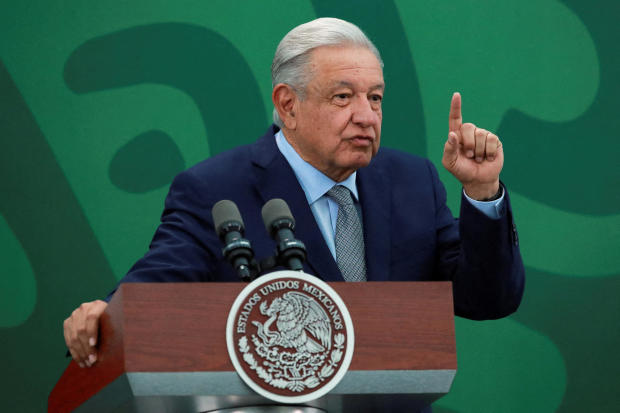Mexico’s president slams U.S. “spying” after 28 Sinaloa cartel members charged, including sons of “El Chapo”
Mexico’s president lashed out Monday at what he called U.S. “spying” and “interference” in Mexico, days after U.S. prosecutors announced charges against 28 members of the Sinaloa cartel for smuggling massive amounts of fentanyl into the United States. The three sons of former drug lord Joaquín “El Chapo” Guzmán — known as the “Chapitos” — were among those charged.
President Andrés Manuel López Obrador suggested Monday that the case had been built on information gathered by U.S. agents in Mexico, and said “foreign agents cannot be in Mexico.”
He called the Sinaloa investigation “abusive, arrogant interference that should not be accepted under any circumstances.”
A former top U.S. drug enforcement agent called the president’s comments unjustified. Mike Vigil, former head of international operations for the Drug Enforcement Administration, said López Obrador was mistakenly assuming that U.S. agents needed to be in Mexico to collect intelligence for the case. In fact, much of the case appears to have come from trafficking suspects caught in the U.S.
“He wants to completely destroy the working relationship that has taken decades to build,” Vigil said. “This is going to translate into more drugs reaching the United States and more violence and corruption in Mexico.”
HENRY ROMERO / REUTERS
López Obrador continued Monday to describe fentanyl – a synthetic opioid that causes about 70,000 overdose deaths annually in the United States – as a U.S. problem, claiming it isn’t made in Mexico. He has suggested American families hug their children more, or keep their adult children at home longer, to stop the fentanyl crisis.
The Mexican president also made it clear that fighting fentanyl trafficking takes a back seat to combating Mexico’s domestic security problems, and that Mexico is helping only out of good will.
“What we have to do first is guarantee public safety in our country … that is the first thing,” López Obrador said, “and in second place, help and cooperate with the U.S. government.”
Vigil pointed out that it was the very same cartels trafficking fentanyl and methamphetamines that cause most of the violence in Mexico. Avoiding confrontations with cartels is unlikely to bring peace, Vigil said, noting “it is going to have exactly the opposite effect.”
The U.S. charges announced Friday revealed the brutal and shocking methods the cartel, based in the northern state of Sinaloa, used to move massive amounts of increasingly cheap fentanyl into the United States.
Federal officials on Friday detailed the Chapitos’ gruesome and cruel practices aimed at extending their power and amassing greater wealth — from testing the potency of the fentanyl they allegedly produced on prisoners to feeding victims of their violence to tigers in order to intimidate civilians.
Apparently eager to corner the market and build up a core market of addicts, the cartel was wholesaling counterfeit pills containing fentanyl for as little as 50 cents apiece.
López Obrador own administration has acknowledged finding dozens of labs where fentanyl is produced in Mexico from Chinese precursor chemicals, mainly in the northern state of Sinaloa.
Most illegal fentanyl is pressed by Mexican cartels into counterfeit pills made to look like other medications like Xanax, oxycodone or Percocet, or mixed into other drugs, including heroin and cocaine. Many people who die of overdoses in the United States do not know they are taking fentanyl.
López Obrador deeply resents U.S. allegations of corruption in Mexico, and fought tooth and nail to avoid a U.S. trial of former defense secretary Gen. Salvador Cienfuegos on U.S. charges of aiding a drug gang in 2020.
López Obrador at one point threatened to kick DEA agents out of Mexico unless the general was returned, which he was. Cienfuegos was quickly freed once he returned. Since then, the Mexican government has imposed restrictive rules on how agents can operate in Mexico, and slowed down visa approvals for a time.
For all the latest World News Click Here
For the latest news and updates, follow us on Google News.


